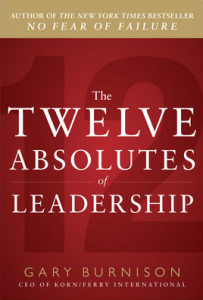/NOTE/ The following is a guest post by Gary Burnison, CEO of Korn/Ferry International
Leadership is less about analytics, and much more about aligning, motivating, and inspiring others. It is empowering people so that their decisions and actions are in line with the overall values and strategy of the organization. Effective leadership begins with purpose.
Purpose is the “why” of the organization. Its companion, vision, is the “what” – a picture of what the organization will look like when purpose is realized.
Based on my conversations with leaders around the globe–which are reflected in my newest book, The Twelve Absolutes of Leadership–and given my experience as CEO of Korn/Ferry International, I can attest to the power of purpose. When employees have a strong sense of purpose, they know that what they do really matters to the organization, to its customers and clients, to society, and even the world at large. Empowered and aligned, they become more engaged.
Purpose is the soul of leadership.
Purpose is not all altruism. Companies, after all, are in the business of making profits. However, purpose must extend beyond money. Purpose and vision are all about making a measurable and meaningful difference to consumers. Purpose needs to be tangible. Everyone at every level of the organization must be able to articulate the purpose, to know why they are working together and what they are accomplishing. Effective leaders use purpose to show their teams what is possible and what is within reach.
Without purpose, individuals and teams can easily go off track. When purpose is lacking, the telltale signs are obvious: fatigue, mediocrity, fractured teams, and goals that are stated but without accountability. Productivity goes off track. Even if people do well, they rarely give their best without purpose. Adapting to change is difficult without purpose, and initiating it is next to impossible. Without purpose, even the best strategies fail.
Everything — policies, programs, strategies, and rewards — must be aligned with purpose. People need to believe that every job and every task, no matter how big or small, is linked to purpose. Inspired leaders use purpose as a beacon that points the organization toward the long-term vision.
The leader must embody the purpose. As the leader, it’s your job to articulate, model, and embody purpose in every communiqué, conversation, and interaction. But make no mistake: purpose has nothing to do with you, your ego, or your accomplishments. In order to be truly motivated and highly effective, your teams needs to see the alignment between what you envision, the values you live, and the strategy you outline to get there. If you are genuine, expressing your passion will electrify the entire team.
Purpose fosters authentic leadership. Purpose grounds the leader and his or her vision in the greater good of the organization and its stakeholders. When I spoke with William Clay Ford Jr., executive chairman of Ford Motor Company, about authentic leadership, he explained it this way: “You’ve got to be true to yourself. You can’t say you want to pattern yourself after someone else. Everyone has his or her own unique style. So it’s important to figure out what your strengths are and what your weaknesses are, and augment those weaknesses as best you can with people who have strengths in those areas. For me, leadership is about being honest with yourself.”
The power of purpose is nearly boundless. Moving forward toward realization of purpose takes courage. The journey, however, is an amazing quest. Purpose inspires change, creates possibility, and elevates the organization. It is the difference between something being done and done well, mediocre and meteoric.
Purpose fosters alignment across the organization. Every day, thousands or even tens of thousands of employees are making countless decisions and taking innumerable actions that must be aligned with the overall goals and strategy of the organization. Purpose makes the difference. It is the glue that keeps the organization united, cohesive, and on track to achieve a grander vision.
____
 Gary Burnison is CEO of Korn/Ferry International, the world’s largest executive recruiting firm and a leader in talent management solutions. He is the author of the New York Times Bestseller, No Fear of Failure (Jossey-Bass, 2011), and the bestselling The Twelve Absolutes of Leadership (McGraw-Hill, 2012).
Gary Burnison is CEO of Korn/Ferry International, the world’s largest executive recruiting firm and a leader in talent management solutions. He is the author of the New York Times Bestseller, No Fear of Failure (Jossey-Bass, 2011), and the bestselling The Twelve Absolutes of Leadership (McGraw-Hill, 2012).
Share this Post

